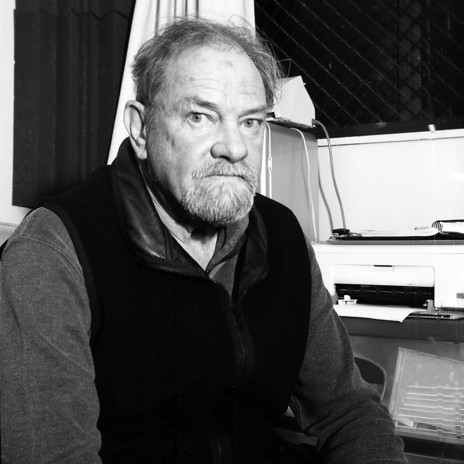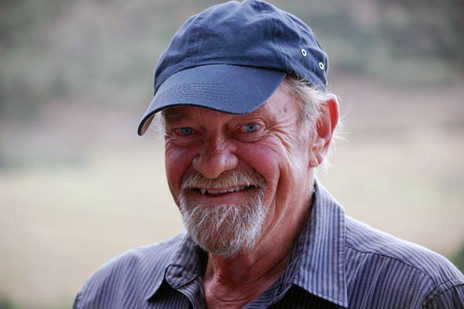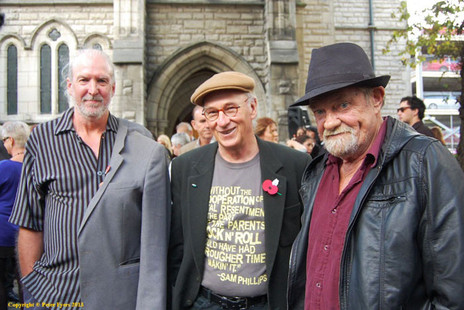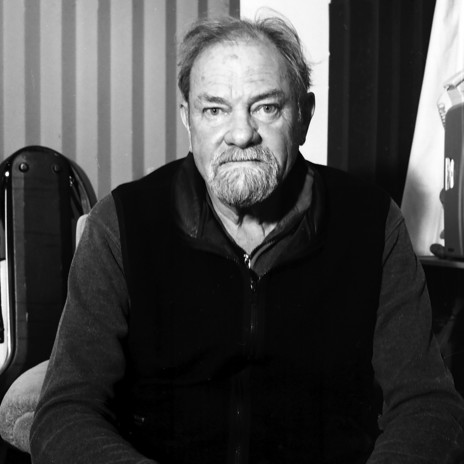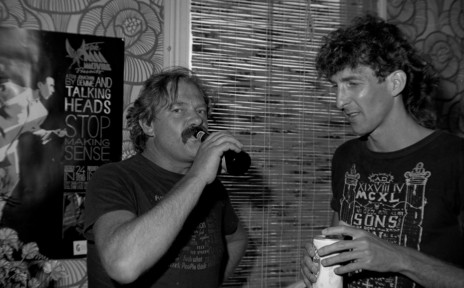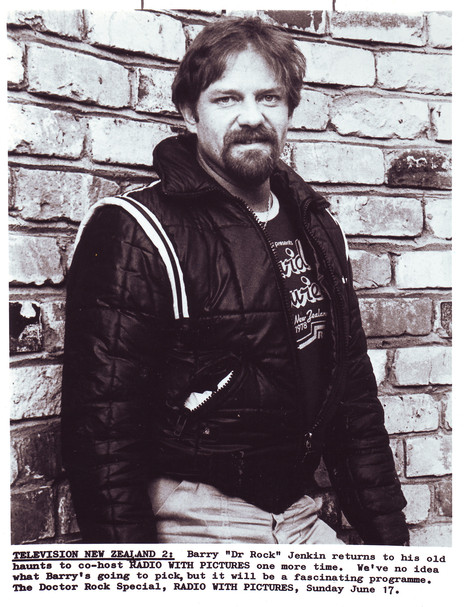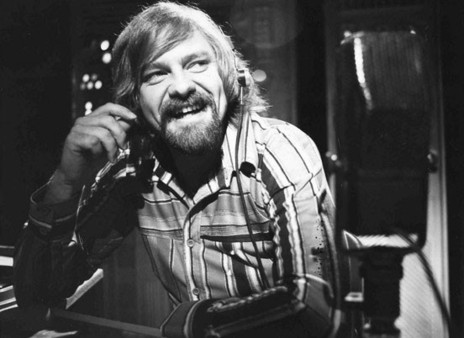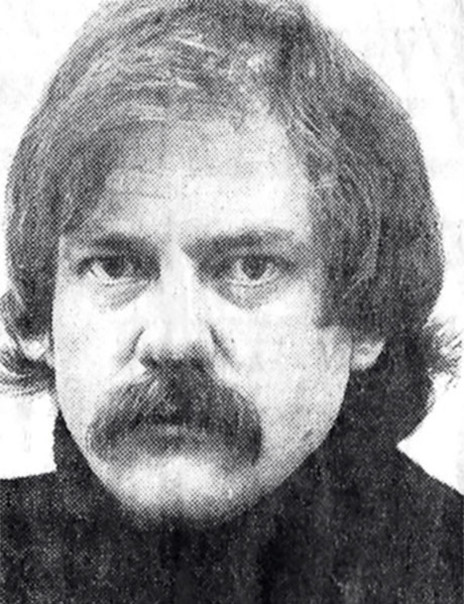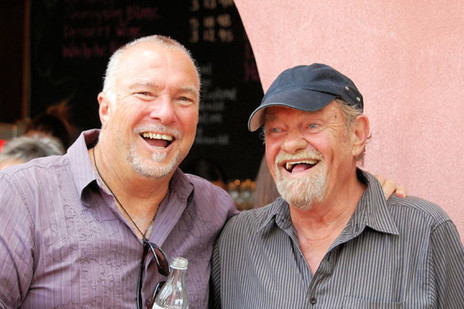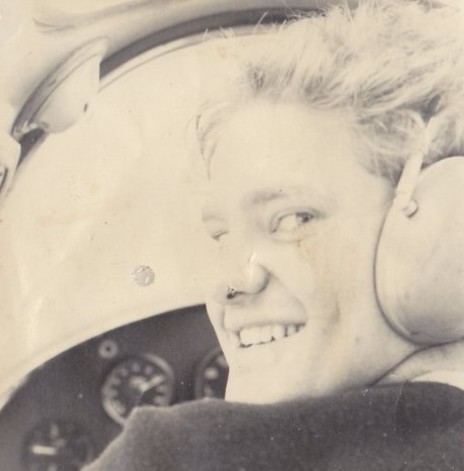Born 1947 in Auckland, by his own admission Jenkin was a late developer when it came to rock and roll. Both parents were classically trained musicians and young Barry was playing the cello from age seven. “I played very badly and gave it up when I was 13,” he remembers. “The noises I made hurt me and they weren’t what they (teachers) wanted. Besides, Pablo Casals was regarded as the world’s best cellist and he was in his seventies; I couldn’t wait that long.”
In the mid-1960s Jenkin’s listening habits saw rock and roll assume dominance but his first foray into radio was on the YC classical network. “I spent my teens in a variety of jobs and I was 21-22 when I took the NZBC’s radio announcer training course. They only hired me at 2YC (Wellington) because I could correctly pronounce the classical composers!”
In 1969 Jenkin was dispatched to Palmerston North’s 2ZA, where he had his first taste of fame. “There was no private radio, we were the only game in town so I had a profile, a big fish in a small pond.” During his three years at 2ZA, Jenkin’s programmes included a talkback show (“everyone from local bikies to the mayor”) and a weekly show on contemporary folk music (Paul Simon, Joan Baez); he even recorded a live concert by The Human Instinct at the Starlight Ballroom: “We ran the cables from the ballroom and through the cop shop to the radio station …”
Jenkin was at 1ZM when Radio Hauraki’s David Gapes summoned him in 1976.
In 1972 Jenkin was shifted to Auckland’s 1ZM and three years later Radio Hauraki’s David Gapes summoned him. “I told Gapes that the NZBC gave me a pension plan, why should I give that up? He offered me a company car – a Datsun 1200, snaffled off one of the sales staff.” He was given the 7pm-10pm shift and allowed free rein with his choice of music, mostly album tracks but mainstream nevertheless – Little Feat, the Rolling Stones and Steely Dan were favourites. It was at Hauraki that DJ/ programme director Fred Botica gave him the nickname that would stick – Doctor Rock.
It was Alan Thurston, a former Hauraki news producer, who suggested Jenkin as a frontman for TV2/ South Pacific Television’s Radio With Pictures. Although he had no television experience, Thurston considered Jenkin perfect for the role and together they approached South Pacific head Kevan Moore, who was taken with Jenkin’s musical knowledge and dulcet tones. “But what shall we call you?” Moore asked. “I was thinking about Barry Jenkin,” said the bemused broadcaster. “Tsk tsk,” said Moore, “no ring to that. What do they call you at Hauraki? Doctor Rock?” Jenkin’s nickname became his moniker for the television career which followed.
“There were two distinct periods during my tenure at Radio With Pictures,” Jenkin says, “before and after.”
Jenkin was aghast when punk rock reared its head. “I thought the Sex Pistols, the very name, was just a publicity-seeking ploy. I still believed that you needed to be a musician.”
When station founder David Gapes left Radio Hauraki shortly after his arrival, Jenkin no longer had the support to continue his free rein programme but there were no major issues throughout 1976-77 until he became impressed with, first, the Stranglers and Boomtown Rats, and then the whole punk/ new wave school. After finishing his Hauraki shift one evening, he was “kidnapped” by Scavengers manager Doug Elephant, force-fed (ahem) hashish and played a selection of “new wave” acts, the Pistols, Ramones, Television. Barry Jenkin’s life changed overnight.
Mark Everton, then an 18-year-old reporter in the Hauraki news room, remembers it well: “The next night I was lurking in the Hauraki jocks room/ record library, Barry was in the studio next door, looking at the big box of records he kept in there, Steely Dan etc, which no one was allowed to touch. He picked up the box and carried it into the record library and put it down on a desk. I said ‘Barry what the hell are you doing?’ He just looked at me and said, ‘I won’t be needing these anymore.’ ”
Jenkin says, “I threw the baby out with the bath water and from that day on I played nothing but punk and new wave.
“DR ROCK” – AS HE IS KNOWN – IS A LABEL HE regards as PRETENTIOUS.
That attitude survived at South Pacific Television, at least for awhile (“the show wasn’t expected to rate, just fill in an hour’s programming on Sunday night”) but things got heated at Hauraki. “I had a running battle with the PDs – first Graeme Parsonage and then Gary Roberts. My ratings dropped from 51% to 17% so I knew what was coming but there was nothing I could do, there was no going back. Gary gave me an ultimatum, insisting I share my personal picks with more mainstream stuff, which I tried for a couple of shows and then a student hit me up outside Hauraki one night, asking me what the fuck had happened to my show. That was it for me.” His conversion to all things “alternative” was highly problematic at both of his work places. “[RWP producer] Andrew Shaw and I fought like cats; I’m bigger than him so I always won. He’d present me with some clip he wanted screened and I’d say, ‘nah, send it to Ready To Roll.’ The producers had no input. I was bolshie, everyone was out of step with what was happening, I was a long way up myself but I only wanted them to be reasonable, just do it my way.”
But if Radio Hauraki didn’t get it, Jenkin’s former employees at the NZBC did, no doubt aided by his television profile. In 1981 the radio corporation was granted permission to broadcast 24 hours daily, on condition that the additional hours played “alternative music”. Doctor Rock was in and was given that all-important free rein to present his own midnight-to-dawn show on the national ZM network, which he later shared with Andrew Page, week on-week off.
Jenkin credits the NZBC director-general himself with the show’s survival. “Geoffrey Whitehead gave me money to purchase records, those not released in New Zealand. I used to go around the record companies, grabbing stuff which they had no intention of releasing locally; in a handful of cases they did actually release records that I plugged on Radio With Pictures and the ZM All-Nighter. But Geoffrey Whitehead let me bypass that and he even arranged for records to be shipped in through diplomatic bags – a lot of the new stuff I played was debuting simultaneously in Britain and the States.”
But by the time the ZM All-Nighter came along, the Radio With Pictures gig had gone, Jenkin dumped in 1980. As it turned out, the ZM All-Nighter itself lasted just two years, Jenkin sacked after falling asleep at the desk following a drunken evening soiree. Not that Barry Jenkin disappeared – there were spells with student radio (“no money!”) and occasional one-off or relieving radio shifts; he has been a newsreader at several stations and voiced hundreds of TV commercials and the occasional television documentary. He started his own radio station from his home on Waiheke Island but was unable to effectively compete with the big boys on the mainland. Barry Jenkin aka Doctor Rock is currently working towards launching an internet radio station, Radio ISP, in the near future.
Asked if he had any regrets about his career, Barry Jenkin said, “Well I could have been a little less pig-headed, maybe more flexible. It was arrogant to think I knew what was worthy and what wasn’t. But it was all black & white when it came to music – it was either good or it wasn’t.”
--
Barry Jenkin, the rock & roll doctor, passed away on 16 May 2023, aged 75. His daughter, Andra Jenkin, wrote on the Facebook page Good Evening, Citizens, “He's lived exactly as he chose to. To the full, larger than life, belligerently listening to punk. Barry Jenkin, aka Dr. Rock, is dead. His legend lives on.”
--
Read more: Barry Jenkin at the dawn of punk, 1977
